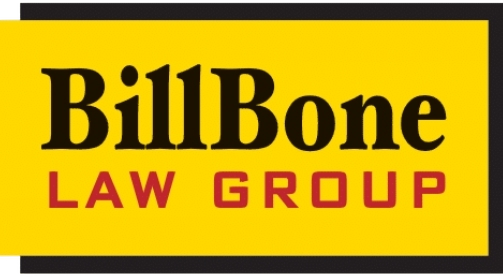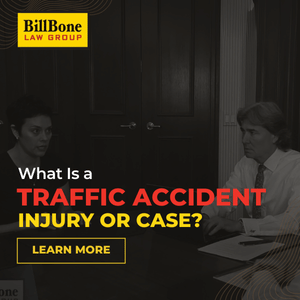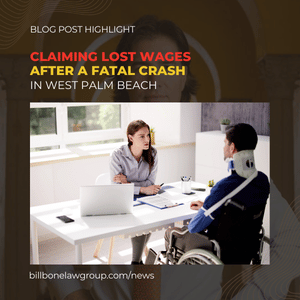Understanding Florida’s no-fault system is essential for anyone involved in a car accident. Every year, thousands of drivers navigate the complex aftermath of car accidents along busy corridors like I-95, Southern Boulevard, and Okeechobee Boulevard in West Palm Beach and throughout Palm Beach County.
When injuries occur, understanding Florida’s no-fault insurance system can mean the difference between getting proper medical care quickly and facing financial hardship.
At Bill Bone Law Group, we’ve represented victims of motor vehicle accidents for over 25 years, helping them understand their rights under Florida’s unique insurance laws.
You may need this article if:
- You or a loved one was injured in a car accident in West Palm Beach
- You’re unsure about your insurance coverage or what benefits you’re entitled to receive
- A family member was killed or severely hurt in a crash, and you need to understand your legal options
- You’re overwhelmed by insurance paperwork or have been denied PIP benefits
Understanding Florida’s No-fault System
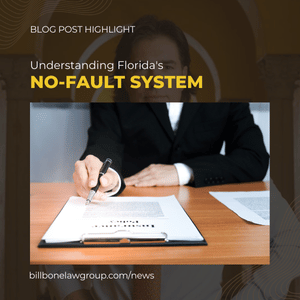 Florida operates under a no-fault insurance system for car accident claims, meaning your own insurance company covers certain expenses and losses related to your accident, regardless of who caused the crash. Florida became a no-fault state on January 1, 1972.
Florida operates under a no-fault insurance system for car accident claims, meaning your own insurance company covers certain expenses and losses related to your accident, regardless of who caused the crash. Florida became a no-fault state on January 1, 1972.
This system centers around Personal Injury Protection (“PIP”) coverage, which every Florida driver must carry as part of their auto insurance policy.
Under Florida Statutes § 627.736, all registered vehicles must maintain a minimum of $10,000 in PIP coverage and an additional $10,000 in Property Damage Liability (“PDL”).
The no-fault designation specifically refers to the fact that your own insurance provides immediate benefits without needing to establish fault or wait for lengthy investigations.
How No-Fault Insurance Works in Palm Beach County
Palm Beach County sees its share of serious accidents, particularly during peak tourist season when traffic volume increases dramatically along coastal routes like A1A and major thoroughfares such as Military Trail, Congress Avenue, and especially I-95.
The Florida Department of Highway Safety and Motor Vehicles’ crash data consistently shows Palm Beach County among the state’s most active areas for traffic incidents.
Under Florida’s PIP system, your insurance covers 80% of necessary medical expenses, prescription costs, and certain rehabilitative services. The remaining 20% of costs often represents a significant financial burden that many accident victims don’t anticipate.
PIP benefits also include 60% of lost wages up to the policy limits, which can provide crucial support during recovery.
The no-fault system was designed to ensure accident victims receive prompt medical treatment without waiting for fault determination. However, this system has limitations that become apparent when dealing with serious injuries or disputes over coverage.
Can I File a Lawsuit Under Florida’s No-Fault System?
Florida’s no-fault automobile insurance laws, also known as Florida’s no-fault law, generally ban injured parties from bringing lawsuits against at-fault parties to recover noneconomic damages, such as pain and suffering and loss of consortium, although there are some exceptions.
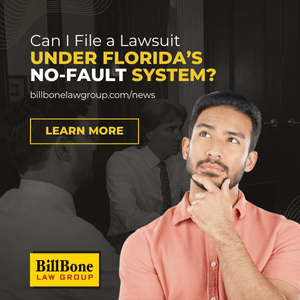 These exceptions occur when an accident victim suffers a permanent loss of an important bodily function, permanent injury, significant and permanent scarring or disfigurement, or death. If you were involved in an accident and lost a loved one, you may still be entitled to damages beyond what PIP covers.
These exceptions occur when an accident victim suffers a permanent loss of an important bodily function, permanent injury, significant and permanent scarring or disfigurement, or death. If you were involved in an accident and lost a loved one, you may still be entitled to damages beyond what PIP covers.
The “serious injury threshold” represents a critical concept in Florida law. If your injuries meet this threshold, you may step outside the no-fault system and pursue additional compensation from the at-fault driver.
This includes damages for pain and suffering, mental anguish, loss of enjoyment of life, and other non-economic losses that PIP doesn’t cover.
Recent tort reform changes in March 2023 have also reduced the period for filing a personal injury claim from four years to two years, making it essential to act quickly if you’re considering legal action.
What’s Covered by PIP?
Medical Expenses – Emergency Medical Condition (“EMC”)
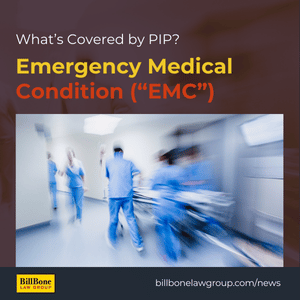 Basic PIP insurance provides reimbursement for 80% of an injured motorist’s reasonable expenses incurred for medically necessary medical, surgical, X-ray, dental, and rehabilitative services, including prosthetic devices and medically necessary ambulance, hospital, and nursing services. F.S. § 627.736(1)(a).
Basic PIP insurance provides reimbursement for 80% of an injured motorist’s reasonable expenses incurred for medically necessary medical, surgical, X-ray, dental, and rehabilitative services, including prosthetic devices and medically necessary ambulance, hospital, and nursing services. F.S. § 627.736(1)(a).
The statute defines “medically necessary” as any medical service or supply that a prudent physician would provide for the purpose of preventing, diagnosing, or treating an illness, injury, disease, or symptom. F.S. § 627.732(2).
The complete basic PIP payout of $10,000 applies exclusively to EMC. F.S. § 627.736(1)(a)(3). An EMC is characterized as an acute medical condition of sufficient severity that, without immediate treatment, could reasonably result in (1) serious jeopardy to patient health, (2) serious impairment to bodily functions, or (3) serious dysfunction of any bodily organ or part. F.S. § 627.732(16).
To illustrate, if your total medical expenses, minus your deductible amount (discussed below), for treating an emergency medical condition were $5,000, basic PIP would provide $4,000 ($5,000 x 80% = $4,000).
Medical Expenses – Non-Emergency Treatment
Reimbursement for non-emergency medical treatment is restricted to a maximum of $2,500. F.S. § 627.736(1)(a)(4). Non-emergency medical conditions encompass those that fail to satisfy the requirements of an emergency medical condition under F.S. § 627.736(1)(a)(3).
Disability
Basic PIP insurance provides coverage for 60% of any loss of gross income (lost wages) when an injured motorist cannot return to work due to injuries sustained in an accident.
The PIP disability benefit also encompasses ordinary and necessary household services that the injured motorist would typically perform independently (replacement services), including laundry, house cleaning, lawn care, pet care, and similar tasks. F.S. § 627.736(1)(b).
For instance, if your total medical expenses for treating an emergency medical condition minus your deductible amount (discussed below) were $5,000 and lost wages totaled $10,000, basic PIP would provide the $10,000 maximum benefit ($5,000 x 80% = $4,000 plus $10,000 x 60% = $6,000 for a combined total of $10,000)
The $10,000 PIP limit encompasses both medical and disability benefits, meaning the total basic PIP payout under both benefits combined reaches $10,000, rather than a $10,000 limit for each individual benefit.
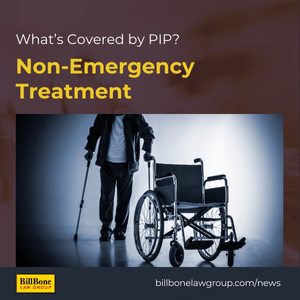 Death Benefit
Death Benefit
Basic PIP insurance provides $5,000 in death benefits “resulting from bodily injury, sickness, disease, or death arising out of the ownership, maintenance, or use of a motor vehicle.”
The $5,000 death benefit applies to each person who dies in an accident or event covered by PIP insurance, and it operates in addition to the medical and disability benefits. F.S. § 627.736(1).
Acts of Violence
The Florida Supreme Court has explained that “[a]cts of violence are an ageless and foreseeable hazard associated with the use of a vehicle” and consequently ruled that injuries sustained as a result of foreseeable acts of violence “associated with the use of a vehicle” are covered by PIP insurance.
Blish v. Atlanta Cas. Co., 736 So. 2d 1151 (Fla. 1999). Therefore, acts of violence against a claimant “arising out of the ownership, maintenance, or use of a motor vehicle,” including road rage and carjacking incidents, are subject to PIP coverage.
Deductible
The PIP deductible represents the amount that a named insured or named insured and dependent relatives living in the same household are responsible for before PIP coverage is triggered and begins providing payments.
In other words, the deductible is the amount subtracted from a PIP claim check. The higher the deductible selected, the lower the PIP premium. The available deductible choices are no deductible, $250, $500, or $1,000.
For example, if your total medical expenses for treating an emergency medical condition were $5,000 and you have a $1,000 deductible, basic PIP would pay $3,200 ($5,000 – $1,000 = $4,000 x 80% = $3,200). This means you remain responsible for the remaining $1,800, even when you are not at fault for the accident.
Conversely, if you have no deductible, your basic PIP payout would be $4,000 ($5,000 x 80% = $4,000), meaning you would be responsible for only $1,000 rather than $1,800. That represents $800 or 56% less than you would owe simply by paying a few additional dollars on your premium.
Who’s Covered by PIP?
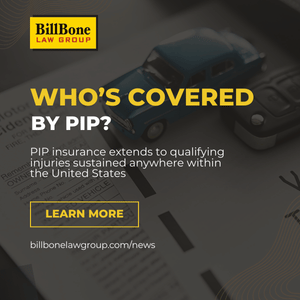 The owner of an insured motor vehicle receives basic PIP protection regardless of whether injuries are sustained while serving as a driver, passenger, pedestrian, or cyclist.
The owner of an insured motor vehicle receives basic PIP protection regardless of whether injuries are sustained while serving as a driver, passenger, pedestrian, or cyclist.
Furthermore, relatives who reside in the same household as the owner, authorized individuals operating the vehicle, vehicle passengers, and pedestrians and cyclists who are struck and injured by the vehicle are entitled to coverage under the owner’s PIP insurance, provided they do not possess their own PIP insurance. F.S. §§ 627.736(1) and (4)(e).
PIP insurance extends to qualifying injuries sustained anywhere within the United States, its territories or possessions, or Canada. F.S. § 627.736(4)(e)(2).
The 14-Day Rule – Must Seek Medical Treatment Within 14 Days of Accident
To establish eligibility for a PIP insurance claim, injured motorists must obtain initial medical treatment from an authorized healthcare provider within 14 days following the accident. F.S. § 627.736(1)(a). Injured motorists who fail to adhere to this stringent deadline are precluded from pursuing a PIP insurance claim.
The following categories of healthcare providers are authorized to provide initial medical care and services for purposes of satisfying the 14-Day Rule and establishing a valid PIP claim: medical doctors, doctors of osteopathic medicine, chiropractors, advanced practice registered nurses, hospitals, and emergency medical personnel. F.S. § 627.736(1)(a)(1).
Basic Steps to File a PIP Claim
Here’s the process for filing a PIP claim:
- Must receive treatment from an authorized medical provider within 14 days of the accident.
- The medical provider will assess whether the injuries constitute an emergency medical condition.
- Submit a written claim to the PIP insurance provider.
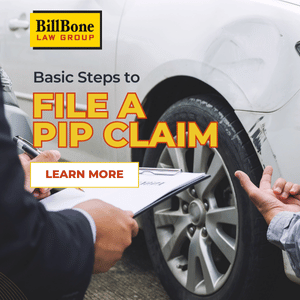 While the 14-Day Rule establishes a rigid deadline for when a claimant must receive initial medical treatment to maintain eligibility for filing a PIP claim, Florida law does not impose similar statutory mandates regarding when a claimant must pursue follow-up medical treatment if necessary or submit a claim to their insurance company. Instead, the claimant’s individual insurance policy will stipulate the timeframe for completing these actions.
While the 14-Day Rule establishes a rigid deadline for when a claimant must receive initial medical treatment to maintain eligibility for filing a PIP claim, Florida law does not impose similar statutory mandates regarding when a claimant must pursue follow-up medical treatment if necessary or submit a claim to their insurance company. Instead, the claimant’s individual insurance policy will stipulate the timeframe for completing these actions.
Upon filing a claim with the insurance company, the insurer must approve and remit payment or deny the claim within 30 days. F.S. § 627.736(4)(b). If the claim is denied, the insurance company must furnish a written explanation detailing the basis for the denial.
In circumstances where the insurance company maintains a reasonable belief that fraud exists, it must notify the claimant in writing within 30 days of claim submission that an investigation is being conducted. The insurance company is allocated 60 days from the conclusion of the initial 30-day period to complete its fraud investigation. F.S. § 627.736(4)(i).
When PIP Falls Short
The $10,000 minimum PIP requirement often proves inadequate for serious accidents. A single emergency room visit can easily cost several thousand dollars, and extensive injuries requiring surgery, rehabilitation, or ongoing treatment quickly exhaust basic coverage limits.
Many drivers don’t realize they can purchase higher PIP limits or additional coverage options that provide greater protection. Medical payments coverage, uninsured motorist coverage, and higher liability limits all offer additional security beyond the state minimums.
Understanding Your Legal Options
 While Florida’s no-fault system limits certain types of lawsuits, significant exceptions exist. If your injuries meet the serious injury threshold, you may be entitled to substantial additional compensation beyond your PIP benefits.
While Florida’s no-fault system limits certain types of lawsuits, significant exceptions exist. If your injuries meet the serious injury threshold, you may be entitled to substantial additional compensation beyond your PIP benefits.
An experienced attorney can evaluate whether your case qualifies for legal action outside the no-fault system. This assessment considers the nature and extent of your injuries, their impact on your daily life, and the long-term consequences you may face.
Even within the no-fault system, insurance companies sometimes deny or underpay legitimate claims. Legal representation helps ensure you receive all benefits you’re entitled to under your policy.
Ready to Speak With a Lawyer?
Bill Bone Law Group has helped thousands of Florida injury victims seek justice and financial recovery. Our experience with Florida’s no-fault system and personal injury law ensures you receive knowledgeable guidance during this difficult time.
We offer a free consultation and case review.
If you or someone you love has been injured in a car accident, you may be entitled to compensation under Florida law. The experienced attorneys at Bill Bone Law Group are ready to fight for your rights.
Call us now to discuss your case with an experienced West Palm Beach accident attorney. A consultation with our team can also help in understanding Florida’s no-fault system and how it applies to your claim.
